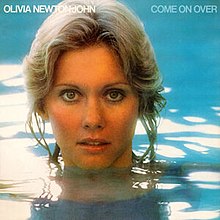| Come On Over | ||||
|---|---|---|---|---|
 | ||||
| Studio album by | ||||
| Released | March 1976[1] | |||
| Recorded | October–November 1975 | |||
| Studio | Abbey Road Studios, London | |||
| Genre | ||||
| Length | 41:10 | |||
| Label | MCA | |||
| Producer | John Farrar | |||
| Olivia Newton-John chronology | ||||
| ||||
| Singles from Come On Over | ||||
| ||||
| Review scores | |
|---|---|
| Source | Rating |
| AllMusic | |
Come On Over is the seventh studio album by British-Australian singer Olivia Newton-John, released in March 1976. The album peaked at number two on the US Top Country Albums chart and number 13 on the US Billboard 200.
The lead single released from the album was the title song, written by Barry Gibb and Robin Gibb and originally featured on the Bee Gees' 1975 album Main Course. It was a moderate pop hit, peaking at number 23 on the US Billboard Hot 100, but did much better on the country (number 5) and adult contemporary (seventh of ten number 1 singles) charts. In New Zealand, the title track reached number 3.[2]
The album's first track, a cover of Dolly Parton's "Jolene", was only released as a single in Japan, and it became a hit there, peaking at number 11 on the Oricon Singles Chart. The album itself was also a success in the Japanese market, reaching the number 2 position on the Oricon Albums Chart. It was released in Australia in 1978 where it peaked at number 29.[3]
The album also included versions of the traditional song "Greensleeves" and The Beatles' "The Long and Winding Road" (the ending track), as well as "Who Are You Now?", originally featured in the 1973 movie Hurry Up, or I'll Be 30. Besides Parton's "Jolene" the album also boasts covers of recent country hits by Willie Nelson ("Blue Eyes Crying in the Rain") and Lynn Anderson ("Smile For Me").
- ^ a b Viglione, Joe. Come On Over at AllMusic
- ^ (Chart 2699) Nztop40.co.nz. Retrieved 23 October 2016.
- ^ Cite error: The named reference
auchartwas invoked but never defined (see the help page).